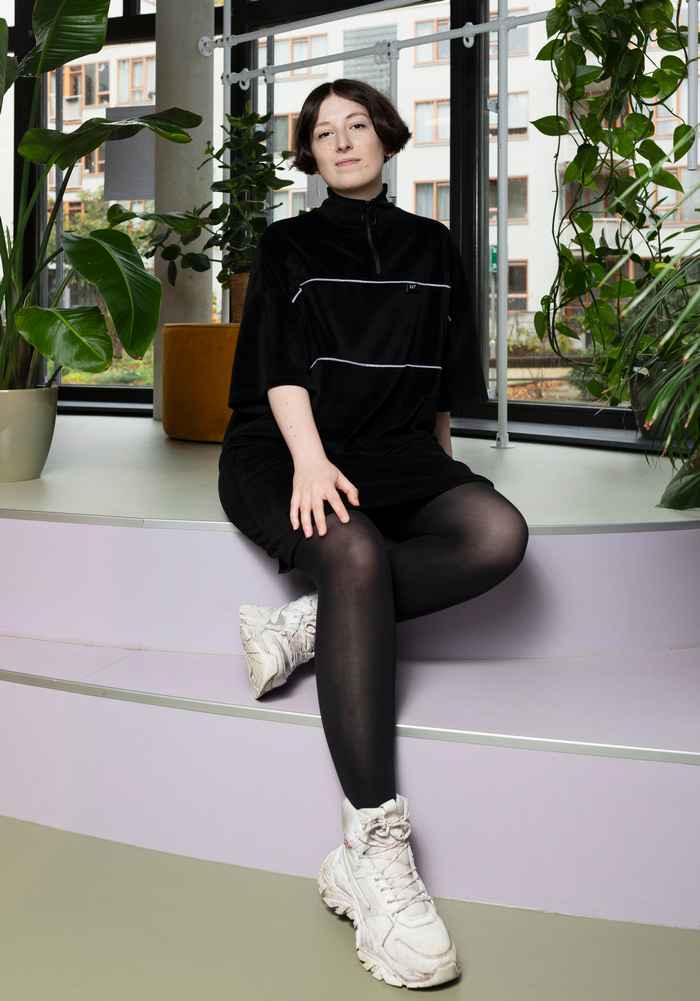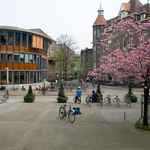STUDENT IN RESIDENCE: Meet Alina Tomescu
- Date
- 1 January 2024
- Location
- BG 3
- Room
- VOX-POP
Student in Residence
In this new calendar year, VOX-POP is starting a new deepening of the talent programme. Every year, we already accommodate a group of five students who want to develop as programme makers and gain work experience. In addition, for students or recent graduates who already have work experience and want to create a programme independently, we now offer two student residencies per year. This year, we are working with Alina Tomescu and Sam Kailani.
In 2024, they will develop a programme series at VOX-POP. They receive a basic fee, a programme budget and content and production guidance. They can raise any additional funds themselves. Conditions are that such a programme makes a link between everyday life and humanities, involves the academic community of the Faculty of Humanities as well as communities from the city, and highlights innovative perspectives.
Introducing Alina Tomescu with her programme Nocturnal Dialogues

Who are you?
I am Alina and I have always been passionate about cities and the way that culture contributes to their development. I have worked for 7 years on various projects related to heritage and cultural programming in relation to regional and local development. For example, I worked on a project that aimed to develop more inclusive policies for castles, manors and estates in various countries in Europe, so that local communities can benefit more from their local heritage sites.
In 2021, I decided to take a step back and go back to university to focus on exploring academically what the city at night means, and how night studies can enhance my practice until that moment. I noticed that me and several of my friends would feel more comfortable during the night, and that the city opens itself up for different uses during the dark hours. I dived into this topic first through a pre-masters in Cultural Sociology at Erasmus Rotterdam, and then through a more humanities-focused master's programme at the UVA in Comparative Cultural Analysis.
What will you create at VOX-POP?
Now that I have finished this study and reflection time, I have a lot to share! I have read and written a lot about the history of the night in cities and how it's been perceived, from its magical and dark stories, to its way as a leisure culture of consumption. Did you know that when Paris wanted to add street illumination, there was a protest movement? People were afraid that urban illumination would signify an increase of government control of the city at night, imposing on its freedom, and also that it would remove the ability to see the stars.
The contemporary urban night can on the one hand provide a space and time when some misfits and underrepresented communities can thrive, where social structures can become more permeable and malleable. At the same time, it can also be a hostile space for many groups, in which some of the inequalities of the city get enhanced. Life at night can be more expensive, more dangerous, and less accessible to certain communities, depending on issues such as gender, sexuality, ethnicity, income levels or educational background.
For VOX-POP, I have designed a full programme to explore various aspects of the city at night. There will be five sessions, exploring themes such as the history of nightlife in the city, night rituals across cultures, nature and ecosystems during the night, night-specific activism and the role of the night in sustaining activist movement, as well as diving into the politics of (dance) music. For each session, academic speakers and active night organisers and practitioners will come together to share their work and engage in open conversation. This will be connected to other activities, such as walks, movie screenings, or workshops.
What are your motivations for creating this programme?
The programme I designed for VOX-POP aims to expand the boundaries of what the urban night can mean and for whom it is available. The night is an extremely interesting paradigm of looking at the city, yet it is chronically understudied and under-discussed.
Even though there is an increasing amount of fascinating research from academia on this topic, coming from fields as diverse as urban geography, sociology, biology, neurosciences, religion studies, music studies and many others, these studies are not that often shared between disciplines and even less with a public or with practitioners.
With this programme, I hope to help bridge this gap between various academic disciplines, as well as between academia and public, in order to make these interesting stories more accessible to those inhabiting the night. By bringing together various academics, activists, artists and night dwellers, I hope to contribute to the accessibility of academic thought, and to provide a means for reflection for the current night practices.
Who is this programme interesting for? Why go to it and what can it bring people?
This programme will be interesting for students and academics from a very diverse set of disciplines, as well as creatives, night workers, night owls, and anyone interested in the city at night. This programme aims to provide a low-barrier context for conversation around an aspect of the city we experience every single day, yet rarely think about in this way. The hands-on activities and intriguing conversations will hopefully be invitations to engage more meaningfully (and perhaps politically) with what the night means for us individually and collectively.
What do you hope the period in which you will work as a student-resident will bring you?
I am very excited about this invitation from VOX-POP to share my enthusiasm about the urban night and the specific challenges and opportunities it offers. I think all too often conversations about night in the city are centered around discourses of economic capital, and I would like to go beyond that. My motivation is a more inclusive view of the nocturnal city, that allows for increased livability for all its inhabitants, human or non-human, and perhaps an increased amount of freedom compared to the daytime societal constraints.
